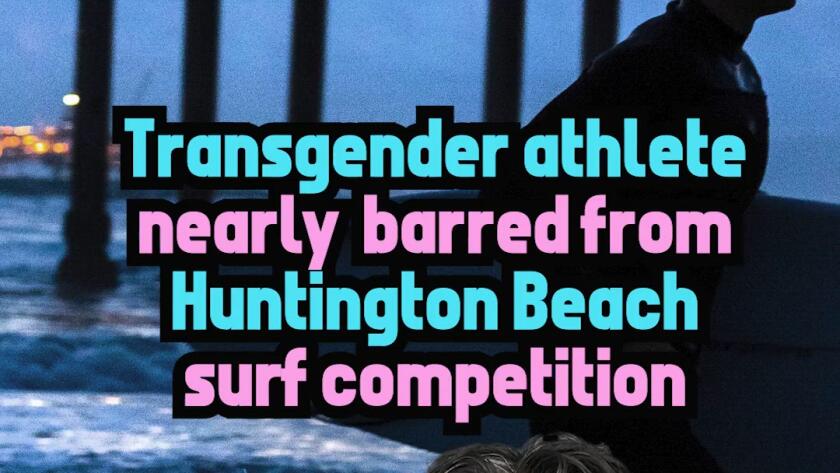A surf contest tried to bar transgender athlete. The California Coastal Commission intervened
The California Coastal Commision ruled that ‘prohibiting or unfairly limiting transgender athletes… does not meet the requirements of the public access policies of the Coastal Act.’
A Huntington Beach surf competition tried barring a transgender athlete from competing in the women’s division. Then the California Coastal Commission got involved.
Here’s how it happened:
Surfer Sasha Jane Lowerson asked if she could participate in the Orange County contest. She got no response. The organizers put out a call for more female entrants. Lowerson applied, and again, reportedly no response.
Organizers then release a video saying surfers could enter only the category of the gender they were assigned at birth, pointing to the rules of the International Surfing Assn.
But ISA updated its rules last year, allowing trans women to compete in a women’s event with a written declaration of identity and tells the ISA’s medical commission that the contender’s testosterone level was continuously below a certain concentration for the last 12 months -- requirements that Lowerson met.
Surf equity activists then contacted the California Coastal Commission, which said the beach is for everyone.
The California Coastal Commission regulates development along the state’s coastal zones. It also protects public access to the beach.
California decided, directly by the vote of the people, to develop this government body following the signing of the Coastal Act of 1976. And as one of the country’s strongest environmental safeguards, it’s kept the state’s shoreline from being plundered by private development.
The commission said the surf competition “[impeded] access by discriminating against transgender surfers.”
This isn’t the first time the commission has used its stewardship to intervene against discrimination on public land. The organizers have agreed to allow trans entrants to the competition taking place Saturday. Lowerson has reportedly chosen not to participate.
Learn more: Battle in Huntington Beach after transgender surfer barred from longboard competition
Here’s how it happened:
Surfer Sasha Jane Lowerson asked if she could participate in the Orange County contest. She got no response. The organizers put out a call for more female entrants. Lowerson applied, and again, reportedly no response.
Organizers then release a video saying surfers could enter only the category of the gender they were assigned at birth, pointing to the rules of the International Surfing Assn.
But ISA updated its rules last year, allowing trans women to compete in a women’s event with a written declaration of identity and tells the ISA’s medical commission that the contender’s testosterone level was continuously below a certain concentration for the last 12 months -- requirements that Lowerson met.
Surf equity activists then contacted the California Coastal Commission, which said the beach is for everyone.
The California Coastal Commission regulates development along the state’s coastal zones. It also protects public access to the beach.
California decided, directly by the vote of the people, to develop this government body following the signing of the Coastal Act of 1976. And as one of the country’s strongest environmental safeguards, it’s kept the state’s shoreline from being plundered by private development.
The commission said the surf competition “[impeded] access by discriminating against transgender surfers.”
This isn’t the first time the commission has used its stewardship to intervene against discrimination on public land. The organizers have agreed to allow trans entrants to the competition taking place Saturday. Lowerson has reportedly chosen not to participate.
Learn more: Battle in Huntington Beach after transgender surfer barred from longboard competition

